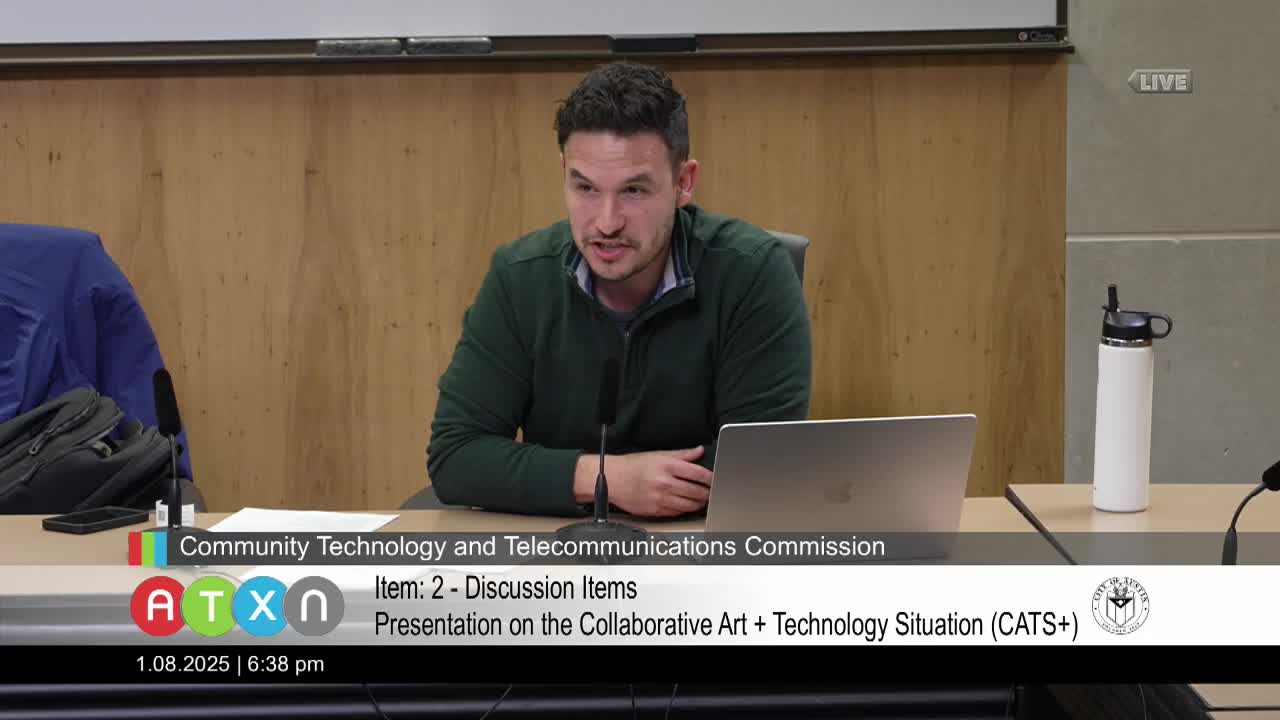Museum of Human Achievement describes GTOPS-funded digital arts residencies that paid 39 artists
Get AI-powered insights, summaries, and transcripts
Subscribe
Summary
At the Jan. 8 Community Technology and Telecommunications Commission meeting, Rachel Stuckey of the Museum of Human Achievement detailed GTOPS-funded residencies and other programs that provided paid opportunities, exhibitions and partnerships for local digital artists.
Rachel Stuckey, director of digital arts at the Museum of Human Achievement, told the Community Technology and Telecommunications Commission on Wednesday that the organization's GTOPS-funded programs created paid opportunities for 39 artists in 2024 and emphasized access and affordability for East Austin artists.
Stuckey said the museum runs several residency tracks, including CATS Plus, a paid residency focused on art and technology; a spring "computer club" of workshops; a residency round targeted at indie game developers timed to Fantastic Arcade; and a live audiovisual production residency tied to local theater productions. "Our vision is for an empowered, resilient, creative community where each member has resources to foster well-being, prosperity, and a self determined future," Stuckey said.
The museum reported program details and participant outcomes. Stuckey said the CATS Plus residency typically runs three 10-week sessions with cohorts of about six individuals, and the program produced hands-on exhibitions — including a final show staged in a converted city bus — and public demonstrations such as projection-mapped works and EEG-controlled video art. Partnerships with local game studios, including Mighty Coconut, Fingy and Devolver, supported the residency aimed at game developers, Stuckey said.
Stuckey told commissioners the museum’s programs reached a mix of resident artists and casual participants: 24 resident artists plus 15 drop-in participants were served in the GTOPS-funded digital arts programs in 2024. Participant survey results from the museum showed 83% reported increased professional networks or sense of community and 83% reported increased confidence using creative media technology; 75% said they gained familiarity with tech resources. Stuckey added that 67% of past participants later returned in roles such as mentors, board members, contract workers or studio members at the museum.
Commissioners asked about funding sources. Commissioner Das Gupta asked whether the museum receives private, state or federal funds and how political pushback on DEI efforts has affected support. Stuckey said the museum relies heavily on small private donations and foundation support, and that the National Endowment for the Arts funds some programs. She said video game company support helped the Fantastic Arcade–focused residency but has declined recently. "NEA in the programs that fund us fared okay in the last Trump presidency, and their outlook is okay going forward," Stuckey said, and added the museum is pursuing larger individual donors and private foundations.
Commissioners thanked Stuckey and said they would like invitations to future events. Stuckey said the next season of CATS Plus workshops begins in March and that the museum will circulate event information through the commission liaison.
The presentation concluded with Stuckey providing the museum’s website and program pages as contact points for commissioners and the public.
